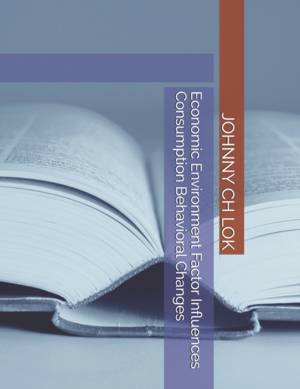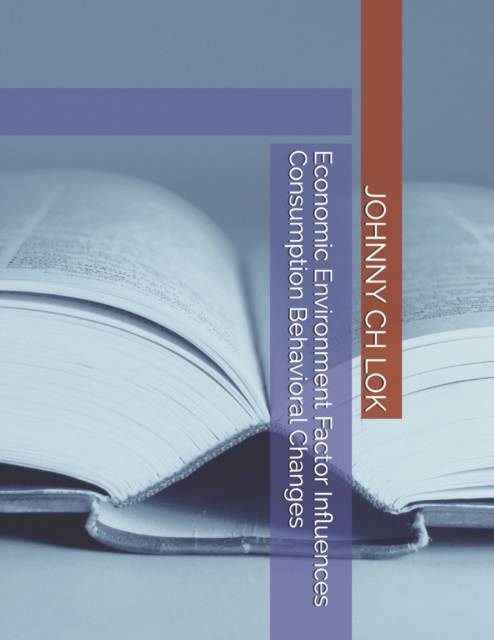
Door een staking bij bpost kan je online bestelling op dit moment iets langer onderweg zijn dan voorzien. Dringend iets nodig? Onze winkels ontvangen jou met open armen!
- Afhalen na 1 uur in een winkel met voorraad
- Gratis thuislevering in België vanaf € 30
- Ruim aanbod met 7 miljoen producten
Door een staking bij bpost kan je online bestelling op dit moment iets langer onderweg zijn dan voorzien. Dringend iets nodig? Onze winkels ontvangen jou met open armen!
- Afhalen na 1 uur in een winkel met voorraad
- Gratis thuislevering in België vanaf € 30
- Ruim aanbod met 7 miljoen producten
Zoeken
Economic Environment Factor Influences Consumption Behavioral Changes
Johnny Ch Lok
€ 46,45
+ 92 punten
Omschrijving
Nowadays, political scientists began to apply quantitative methods to classify and measure political interactions. In general, any countries' policies that maximize growth are optimal that cares solely about pure " capitalists". The greater, the inequality of wealth and income, the higher rate of taxation and the lower growth. It shows that inequality in land and income ownership is negatively with subsequent economic growth. Many economists have tried to explain lower growth rates and unemployment with a growing tax burden in many developed countries. Although, the impact of taxes on growth can be observed both from the aspect of efficiency and aspect of changes in equity that taxes introduce to economy.I shall indicate how to apply quantitative evidence to review policy to review human development strategy. In fact, economic or welfare outcomes to changes in regulatory policy has close relationship to be suggested outcome indicate to reduce risk face economic recession occurrence to any countries. Every country government ought design to gather quantitative data to prepare any policy implementation to support mutual learning and best practice in different societal and market conditions. The goal is to help countries to build better government systems and implement policies at both national and regional level that lead to sustainable economic and social development.The critical public policy challenge is to ensure that the expected economic benefits from regulatory changes are both achieved and outweigh any economic cost imposed. I shall indicate evidence on the outcomes of regulatory policies to help policymakers how design regulatory measures that work better. This method is called ''regulatory management''. This regulatory management study suggests some conclusions to any policymakers as below: ⦁Firstly, poorly designed policy regulation can not raise economic activities and ultimately reduce economic growth. ⦁Secondly, it is impossible between a regulatory policy change and the impact on economic outcomes, such as economic growth is from statistic method easily. ⦁Thirdly, the reliance on economic recession analysis to investigate the relationship across countries between regulatory variables and economic outcomes may not be readily applicable to any countries and may not always be expressed in economic values. It is particularly useful in developing countries regulatory policy measures for recommendation to policymakers only. ⦁Fourthly, most quantitative studies deal with the costs of regulation and give little or no attention to quantifying the benefits of regulation. For the policymaker, it is important to compare the estimated costs of regulation. Any policy regulation is intended to correct market failures and assist to economic efficiency and growth. The public policy aims to reduce socially unacceptable income and wealth distributions or it can satisfy expectation that the public should have access to certain products and services, e.g. health care and education irrespective of ability to pay, such as merit products. Some of regulation, that governments need to concern, e.g. of property rights, company law, law of contract etc. and regulation can provide important economic and social, including environmental benefits.
Specificaties
Betrokkenen
- Auteur(s):
- Uitgeverij:
Inhoud
- Aantal bladzijden:
- 540
- Taal:
- Engels
- Reeks:
Eigenschappen
- Productcode (EAN):
- 9781651780039
- Verschijningsdatum:
- 27/12/2019
- Uitvoering:
- Paperback
- Formaat:
- Trade paperback (VS)
- Afmetingen:
- 216 mm x 279 mm
- Gewicht:
- 1233 g

Alleen bij Standaard Boekhandel
+ 92 punten op je klantenkaart van Standaard Boekhandel
Beoordelingen
We publiceren alleen reviews die voldoen aan de voorwaarden voor reviews. Bekijk onze voorwaarden voor reviews.











